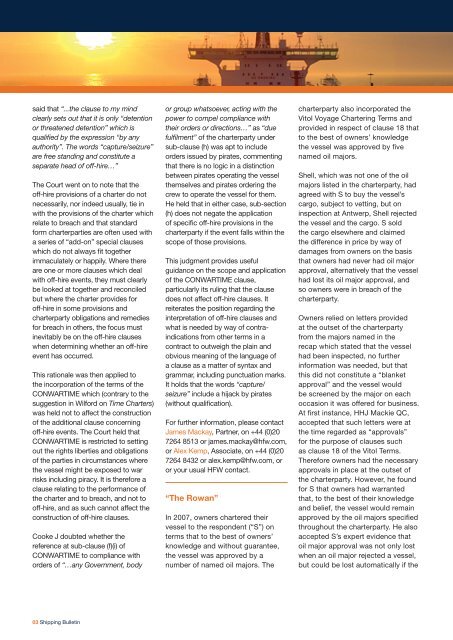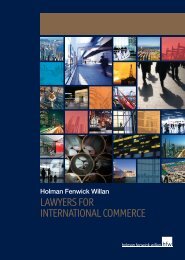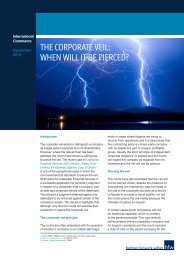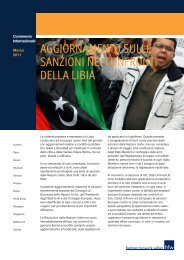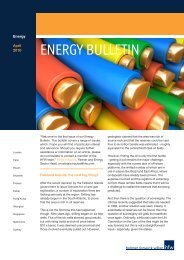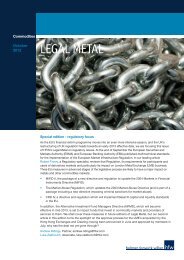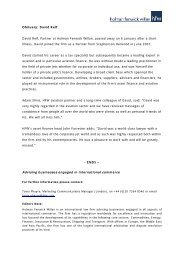Create successful ePaper yourself
Turn your PDF publications into a flip-book with our unique Google optimized e-Paper software.
said that “...the clause to my mind<br />
clearly sets out that it is only “detention<br />
or threatened detention” which is<br />
qualified by the expression “by any<br />
authority”. The words “capture/seizure”<br />
are free standing and constitute a<br />
separate head of off-hire…”<br />
The Court went on to note that the<br />
off-hire provisions of a charter do not<br />
necessarily, nor indeed usually, tie in<br />
with the provisions of the charter which<br />
relate to breach and that standard<br />
form charterparties are often used with<br />
a series of “add-on” special clauses<br />
which do not always fit together<br />
immaculately or happily. Where there<br />
are one or more clauses which deal<br />
with off-hire events, they must clearly<br />
be looked at together and reconciled<br />
but where the charter provides for<br />
off-hire in some provisions and<br />
charterparty obligations and remedies<br />
for breach in others, the focus must<br />
inevitably be on the off-hire clauses<br />
when determining whether an off-hire<br />
event has occurred.<br />
This rationale was then applied to<br />
the incorporation of the terms of the<br />
CONWARTIME which (contrary to the<br />
suggestion in Wilford on Time Charters)<br />
was held not to affect the construction<br />
of the additional clause concerning<br />
off-hire events. The Court held that<br />
CONWARTIME is restricted to setting<br />
out the rights liberties and obligations<br />
of the parties in circumstances where<br />
the vessel might be exposed to war<br />
risks including piracy. It is therefore a<br />
clause relating to the performance of<br />
the charter and to breach, and not to<br />
off-hire, and as such cannot affect the<br />
construction of off-hire clauses.<br />
Cooke J doubted whether the<br />
reference at sub-clause (f)(i) of<br />
CONWARTIME to compliance with<br />
orders of “…any Government, body<br />
03 Shipping Bulletin<br />
or group whatsoever, acting with the<br />
power to compel compliance with<br />
their orders or directions…” as “due<br />
fulfilment” of the charterparty under<br />
sub-clause (h) was apt to include<br />
orders issued by pirates, commenting<br />
that there is no logic in a distinction<br />
between pirates operating the vessel<br />
themselves and pirates ordering the<br />
crew to operate the vessel for them.<br />
He held that in either case, sub-section<br />
(h) does not negate the application<br />
of specific off-hire provisions in the<br />
charterparty if the event falls within the<br />
scope of those provisions.<br />
This judgment provides useful<br />
guidance on the scope and application<br />
of the CONWARTIME clause,<br />
particularly its ruling that the clause<br />
does not affect off-hire clauses. It<br />
reiterates the position regarding the<br />
interpretation of off-hire clauses and<br />
what is needed by way of contraindications<br />
from other terms in a<br />
contract to outweigh the plain and<br />
obvious meaning of the language of<br />
a clause as a matter of syntax and<br />
grammar, including punctuation marks.<br />
It holds that the words “capture/<br />
seizure” include a hijack by pirates<br />
(without qualification).<br />
For further information, please contact<br />
James Mackay, Partner, on +44 (0)20<br />
7264 8513 or james.mackay@hfw.com,<br />
or Alex Kemp, Associate, on +44 (0)20<br />
7264 8432 or alex.kemp@hfw.com, or<br />
or your usual HFW contact.<br />
“The Rowan”<br />
In 2007, owners chartered their<br />
vessel to the respondent (“S”) on<br />
terms that to the best of owners’<br />
knowledge and without guarantee,<br />
the vessel was approved by a<br />
number of named oil majors. The<br />
charterparty also incorporated the<br />
Vitol Voyage Chartering Terms and<br />
provided in respect of clause 18 that<br />
to the best of owners’ knowledge<br />
the vessel was approved by five<br />
named oil majors.<br />
Shell, which was not one of the oil<br />
majors listed in the charterparty, had<br />
agreed with S to buy the vessel’s<br />
cargo, subject to vetting, but on<br />
inspection at Antwerp, Shell rejected<br />
the vessel and the cargo. S sold<br />
the cargo elsewhere and claimed<br />
the difference in price by way of<br />
damages from owners on the basis<br />
that owners had never had oil major<br />
approval, alternatively that the vessel<br />
had lost its oil major approval, and<br />
so owners were in breach of the<br />
charterparty.<br />
Owners relied on letters provided<br />
at the outset of the charterparty<br />
from the majors named in the<br />
recap which stated that the vessel<br />
had been inspected, no further<br />
information was needed, but that<br />
this did not constitute a “blanket<br />
approval” and the vessel would<br />
be screened by the major on each<br />
occasion it was offered for business.<br />
At first instance, HHJ Mackie QC,<br />
accepted that such letters were at<br />
the time regarded as “approvals”<br />
for the purpose of clauses such<br />
as clause 18 of the Vitol Terms.<br />
Therefore owners had the necessary<br />
approvals in place at the outset of<br />
the charterparty. However, he found<br />
for S that owners had warranted<br />
that, to the best of their knowledge<br />
and belief, the vessel would remain<br />
approved by the oil majors specified<br />
throughout the charterparty. He also<br />
accepted S’s expert evidence that<br />
oil major approval was not only lost<br />
when an oil major rejected a vessel,<br />
but could be lost automatically if the


